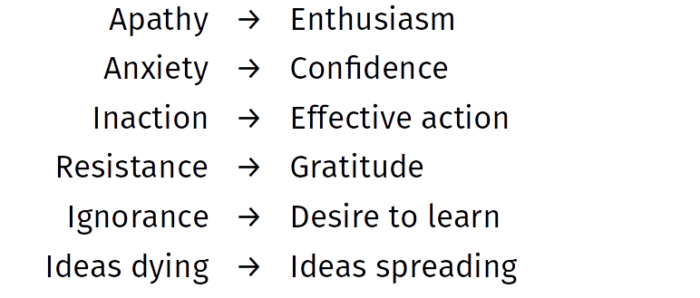The Sustainability Simplified Entrepreneurship Strategy
I see an ever clearer path to humanity achieving sustainability, including governments, corporations, and eight billion individuals. A big part of that vision emerging is seeing that the path isn’t hoping for the best. It will result from people acting in their personal interests as much as they can, helping others.
Here’s a first pass at describing that path as I see it now. I call it our entrepreneurial strategy.
The Foundation
The Spodek Method creates a mindset shift from seeing acting more sustainably as requiring deprivation and sacrifice to being glad to do it, wishing you did it earlier, and expecting that the more you do, the more you’ll want to do more and that sharing it with others will prompt similar feeling plus gratitude in them.
What Made the Entrepreneurship Strategy Click
I recently watched Milton Friedman on the Donahue Show in 1979 (either this video or this one). Donahue suggested that without regulation, companies would grow to monopolize markets. Friedman countered that none are too big to fail. On the contrary, he said, “The bigger they are, the harder they fall.”
It reminded me that while running Microsoft, Bill Gates once said he wasn’t worried about IBM. He was worried about two kids in a garage. At least that’s what I remembered.
Context
Corporations struggle to sound like they’re acting sustainably or promoting sustainability, unable to escape that these efforts amount to greenwashing. They are what I call stepping on the gas, thinking it’s the brake, wanting congratulations.
The fundamental problem is that they want to sell more stuff that cause pollution and depletion. Even service companies want to move people around, enable them to buy more things, and other things that prompt more polluting and depleting. Even if they become more efficient, they use extra profits to promote more sales and hence more polluting and depleting. If you make a polluting system more efficient, you pollute more efficiently.
As a successful podcaster, companies trying to sound green and their publicity firms pitch me daily with such products and services. I won’t stop, say, a company promoting sustainable fashion or reusable coffee cups, and I applaud their intent. I hope they decrease Zara’s sales or whatever in their market, but I don’t see any of them promoting lowering sales or changing the core of their industry goal of selling more.
Every one of them, along with every company I’ve seen anywhere promoting itself as increasing sustainability is stepping on the gas, thinking it’s the brake, wanting congratulations.
Selling more is not selling less.
Effectively no corporation, CEO, or politician is promoting selling less. They don’t want to and largely can’t promote selling less. Whatever their lip service to sustainability, they can’t in practice even promote polluting or depleting less. If not too direct, asking a successful executive or politician in our culture to pollute and deplete less is like asking a parent to slit their child’s throat: it’s the opposite of what they want to do and what made them successful (though I believe some individuals will prioritize supporting humanity over their corporate and political aspirations, or would if they knew how).
Yet billions of people want to live more sustainably. They already know they prefer results like cleaner air, land, water, and food, and more health, safety, and security. They just don’t know it’s possible or could create results they personally prefer in the moment, like liberation, joy, freedom, fun, more time with family, more financial security, and so on. After all, nearly every message on sustainability erroneously says it requires deprivation and sacrifice, including from the most ardent environmentalists. Most of their “solutions” exacerbate the problems.

People feel hopeless, helpless, guilt, shame, despair, and the like so they don’t act. That inaction makes it look like there’s no money to be made in sustainability so no one acts to create more sustainability. They satisfy the demand with the greenwashing I described above, again, exacerbating our environmental problems.
No one has figured out where to make money in actual sustainability, as opposed to greenwashing and stepping on the gas, thinking it’s the brake, wanting congratulations. On the contrary, people see huge profits still to be made in extracting fossil fuels and other polluting, depleting activity. How can Exxon and its peers abandon trillions of dollars underground, leaving assets stranded? Can you think of a way to tell shareholders to just let their shares lose value?
The Entrepreneurial Strategy
People wanting sustainability but seeing no way to achieve it in a way they like is high demand and low supply. More accurately: demand from nearly 8 billion and zero supply to live joyfully sustainably. This situation is about the biggest gap between supply and demand in history.
In entrepreneurial terms, the Spodek Method is like a technology that transforms:

among other emotional transformations. It helps people replace hopelessness, helplessness, guilt, shame, despair, and so on with rewarding emotions that motivate more sustainability.
People who experience it want to share it, expecting others to feel gratitude and want to share it with others. As podcast guest Seth Godin says, “Ideas that spread, win.”
The concept is proved. That is, the workshop consistently produces these results. It doesn’t always work. There’s plenty of room for product development, as with any new technology, but it works. It changes emotions. Multiple workshop participants have trained to become workshop leaders.
There are models for communities that grew similarly: Alcoholics Anonymous, Weight Watchers, and Crossfit, for example. They are hard to start, have steep learning curves, and overcome feelings of helplessness, hopelessness, etc. None cater to simple pleasures or are easy to sell.
Spodek Method workshops haven’t been systematized or made turnkey, but that’s a matter of time. The team is mostly still volunteers, but people pay to take the workshop and are glad for the results. Anything that billions would feel value from can be made profitable, even when we likely make much of it free.
We have to work out the marketing to reach those billions, also a matter of time.
Results
We are creating a workshop that anyone interested can learn to run and charge for that people who take will help promote.
We won’t have to wait for governments, corporation, or other people to act. On the contrary, we will lead governments, corporations, and other people by improving our own lives and ultimately theirs. Changing ourselves is the only way to change them, or at least the fastest, most effective. If you don’t believe it can work, we don’t have to wait for you.
Buying SUVs, takeout, and airplane tickets whose proceeds fund lobbyists and advertisers won’t lead them to stop polluting and depleting to provide more SUVs, takeout containers, and jet fuel. Creating more solar panels, windmills, nuclear reactors, or even fusion reactors won’t change that pattern.
We can motivate Exxon and its peers to leave their assets out of the biosphere by making their value go to zero by decreasing demand for them to zero. They won’t spend money to get something worthless.
This movement is positive, contrary to taxing carbon, trying to stop Exxon while funding them, or throwing paint on works of art.
This solution is consistent with limited government, free market ideals as well as anti-imperialist anti-racist ones. We simply allow entrepreneurs and innovators to solve problems.
Not The Only Strategy
This strategy is not the only one. As it succeeds it will enable political strategies. My upcoming book talks about the big ones there, so I’ll leave their description for there.
Suffice it to say, there’s more to come.
If interested in participating, contact me. It will be the best project you’ve worked on, I predict.
Read my weekly newsletter

On initiative, leadership, the environment, and burpees
Pingback: The Spodek Method Workshop » Joshua Spodek
Pingback: My favorite posts » Joshua Spodek